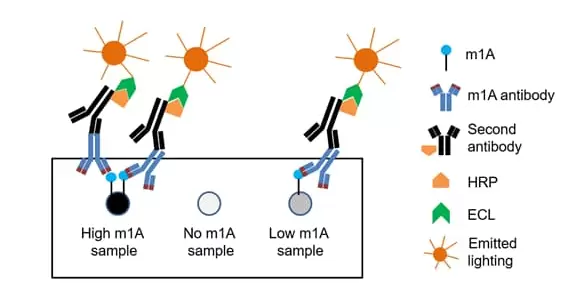m1A (N1-methyladenosine) Dot Blot Assay Kit
Product Description
The RayBiotech m1A dot blot assay provides a simple and rapid method of quantifying the global m1A levels in RNA/DNA, urine, serum, plasma, or other nucleic samples collected from humans, rats, and mice.
Mono-methylation of adenosine in the N1 position, N1- methyladensoine (m1A), is a reversible modification that has been found in tRNA, rRNA, mitochondrial RNA, and mRNA. Functionally, m1A dysregulation affects multiple cellular processes, including RNA structural stability, folding, interactions with proteins, cell viability, cell proliferation, and cell death. m1A tends to be conserved and has been implicated in many critical biological processes including development, disease pathogenesis, circadian rhythm, and embryonic stem cell fate transition, as well as age-related disorders such as Alzheimer’s disease.
The dynamic regulation of m1A in response to physiological stress and the dysregulated expression of m1A regulators have been correlated with tumorigenesis and cancer recurrence. High concentrations of m1A observed in urine and tissue specimens from patients with cancer, rheumatoid arthritis, and AIDS support m1A’s use as a functional biomarker. Current research is constantly uncovering new roles and mechanisms involving m1A. Determining the global changes in m1A levels is necessary to understand both the physiological and pathological states.
How it Works

Graphical representation of m1A quantification by dot blot assay.
Performance Data

Fig.1: Representative image of m1A-specific dot blot assay of RNA, DNA and plasma samples. Total RNA was isolated from the human lung cancer cell line of A431 and quantified by nanodrop, respectively (A). Plasma isolated from colorectal cancer (CRC) and normal health controls (B). m1A dot blot assay followed this protocol.
- Catalog Number
DB-m1A-RB - Supplier
RayBiotech - Size
- Shipping
Blue Ice

